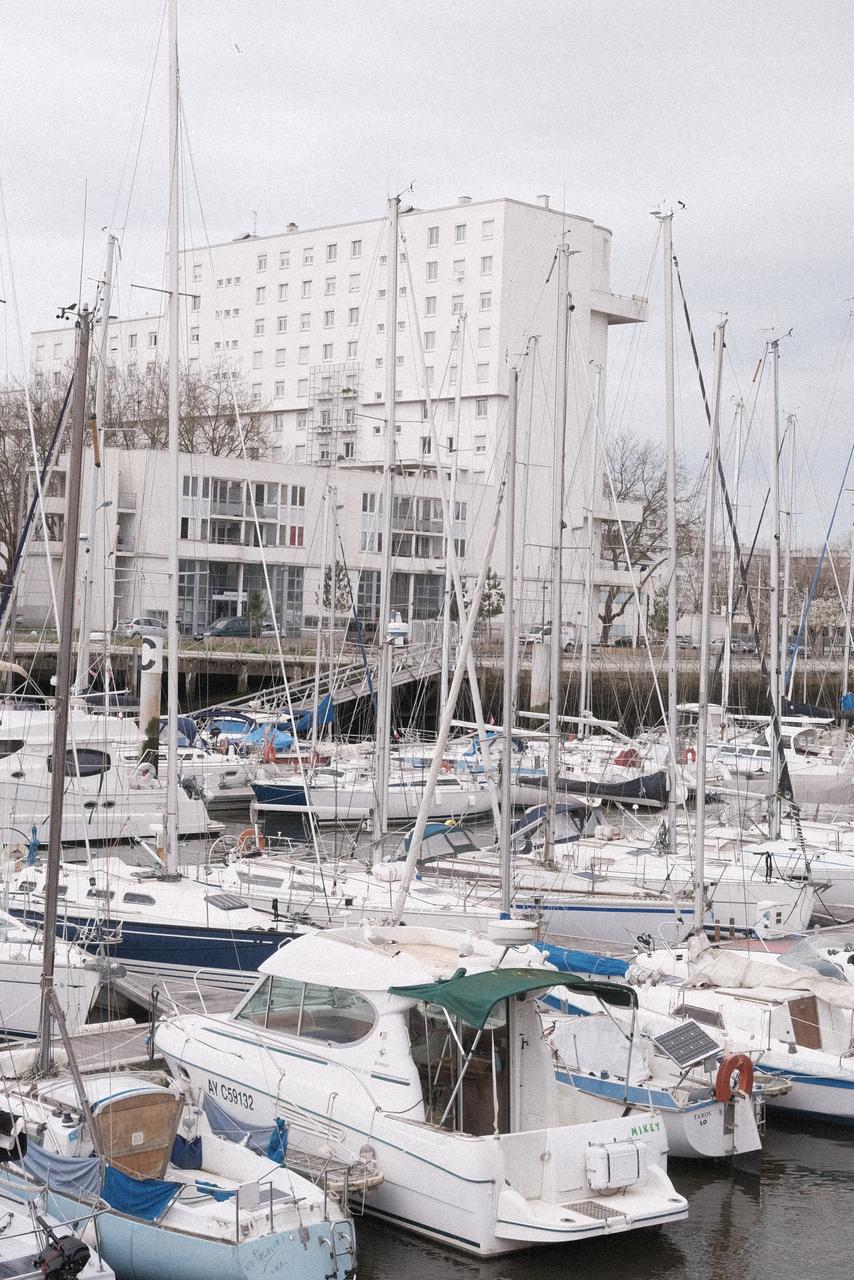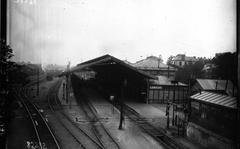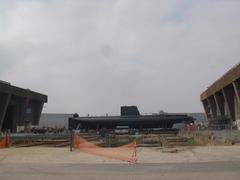
Discover the Hidden Charms of Lorient, Morbihan, France
Date: 14/08/2024
Welcome to Lorient: A City of Surprises
Imagine a city where the whispers of ancient megalithic stones blend seamlessly with the hum of a vibrant port town, where every cobblestone has a story to tell, and the scent of the ocean is ever-present. Welcome to Lorient, Morbihan, a gem tucked away in Brittany, France, that has risen from the ashes of war to become a beacon of resilience and cultural richness. Did you know that Lorient was once the bustling heart of France’s trade with the East, its streets filled with exotic spices and textiles? Picture yourself walking through a city where history isn’t just read in books but is felt in every sea breeze and seen in every historical landmark. From its origins as a hub for the French East India Company in the 17th century to its reconstruction after the devastations of World War II, Lorient offers a tapestry of experiences that cater to both history buffs and casual visitors alike (Wikipedia). Whether you’re captivated by maritime history, intrigued by wartime stories, or simply looking to immerse yourself in Breton culture, Lorient promises an unforgettable journey.
Historical Background
Lorient: A Tale of Rebirth and Resilience by the Sea
Lorient was once the bustling heart of France’s trade with the far-flung corners of the East, its streets filled with the tantalizing aroma of exotic spices. Imagine a city where history isn’t just read about in dusty books but felt in every cobblestone and ocean breeze. Welcome to Lorient, where even the seagulls have stories to tell.
Origins and Early History
Lorient, located in the Morbihan department of Brittany, France, has a rich and varied history that dates back to the 17th century. The town’s origins are closely tied to the establishment of the French East India Company in 1666. The company was founded by Jean-Baptiste Colbert, the finance minister of King Louis XIV, to compete with the British and Dutch East India companies. The name “Lorient” itself is derived from “L’Orient,” meaning “The Orient,” reflecting its role in trade with Asia.
Development as a Major Port
Lorient quickly grew into a significant port town, becoming a hub for maritime trade and shipbuilding. The town’s strategic location on the coast of Brittany made it an ideal spot for the French East India Company to establish its operations. By the 18th century, Lorient had become one of France’s most important ports, dealing in goods such as spices, textiles, and other exotic items from the East.
The Impact of the French Revolution and Napoleonic Wars
The French Revolution and subsequent Napoleonic Wars had a profound impact on Lorient. The town’s shipyards were repurposed for military use, and Lorient became a key naval base. The port was heavily fortified, and its shipyards produced numerous vessels for the French Navy. However, the wars also brought hardship, including blockades and economic difficulties.
World War II and Reconstruction
Lorient’s history took a dramatic turn during World War II. The town was occupied by German forces and became a significant U-boat base. The Germans constructed massive submarine pens, which were heavily bombed by Allied forces. By the end of the war, approximately 80% of Lorient was destroyed. The extensive damage necessitated a comprehensive rebuilding effort, which began in the late 1940s and continued into the 1950s.
Post-War Rebuilding and Modern Era
The post-war reconstruction of Lorient was a monumental task. The town was rebuilt with a modern urban plan, incorporating wider streets and new architectural styles. This period also saw the development of new industries and the expansion of the port facilities. In 2006, Lorient was officially designated as a “Town of Art and History,” recognizing its unique heritage and the successful efforts to preserve its historical sites.
Cultural Significance
Lorient’s cultural significance is evident in its numerous museums and historical sites. The French East India Company Museum in Port-Louis offers insights into the town’s early history and its role in global trade. The Marine Museum, also located in Port-Louis, focuses on underwater archaeology and maritime rescue operations.
Architectural Heritage
The architectural heritage of Lorient is a testament to its rich history and the resilience of its people. The town features a mix of historical and modern architecture, reflecting its reconstruction after World War II. Notable sites include the Hôtel Gabriel, which houses the town’s Heritage Centre and offers guided tours that delve into Lorient’s past.
Themed Urban Walks
For those interested in exploring Lorient’s history on foot, the town offers three themed urban walks. These walks cover different aspects of Lorient’s heritage, including “art and history in the town centre,” “promenade of the villas” (highlighting architectural styles from the 1930s to the 1960s), and “from port to port” (exploring the various ports in the bay). These walks provide a comprehensive overview of Lorient’s historical and cultural landscape.
The Submarine Base
One of the most impressive historical sites in Lorient is the former submarine base, located at Lorient la Base. This massive structure, built by the Germans during World War II, is a stark reminder of the town’s wartime history. Today, it serves as a museum and cultural venue, offering guided tours that explore its construction and use during the war.
The Citadel of Port-Louis
The Citadel of Port-Louis is another must-visit site for history enthusiasts. This well-preserved fortress dates back to the 16th century and offers stunning views of the bay. Visitors can explore the ramparts and visit the museums housed within the citadel, which focus on the history of the French East India Company and maritime archaeology.
The Bomb Shelter
Another poignant historical site in Lorient is the bomb shelter located at Place Alsace-Lorraine. This shelter, used during World War II, has been preserved as a historical monument. Guided tours are available, providing visitors with a glimpse into the lives of Lorient’s residents during the war.
The Enclos du Port
The Enclos du Port area is home to several historical landmarks, including the water tank, Mill Observatory, and Tour de la Découverte. These sites offer unique insights into Lorient’s maritime history and its development as a major port town.
Discover the Hidden Charms of Lorient
An Ancient Beginning
Imagine stepping back to 3000 BC, where the megalithic stones of Lorient whisper tales of ancient civilizations. Picture Gallo-Roman roads weaving through the landscape, connecting historical dots from Vannes to Quimper and Port-Louis to Carhaix (Wikipedia).
Birth of a Seafaring Town
Fast forward to 1666, when Lorient was born as a bustling base for the French East India Company. The town’s name, derived from the majestic ship ‘L’Orient,’ evokes a rich maritime heritage that continues to be a source of pride for its residents.
Engage with Lorient’s History Through Mini-Quests
To truly immerse yourself in the history of Lorient, why not embark on a series of engaging mini-quests? Here are a couple of examples to get you started:
-
Megalithic Mystery: Visit the ancient megalithic sites and unlock the secrets of these enigmatic stones. Use the Audiala app to scan QR codes at each site and uncover fascinating facts and historical narratives.
-
Gallo-Roman Road Adventure: Follow the ancient routes that once connected vital towns. As you walk these historical paths, the Audiala app will provide interactive maps and quizzes to test your knowledge, making your journey both educational and entertaining.
Call to Action: Discover Lorient with Audiala
Ready to explore Lorient like never before? Download the Audiala app today and transform your visit into an unforgettable adventure. With Audiala, you’ll uncover hidden stories, participate in exciting quests, and deepen your connection to this historic town. Don’t just visit Lorient—experience it!
Visitor Tips for Lorient, Morbihan, France
Ahoy! Discovering Lorient: Gateway to Brittany’s Hidden Treasures
Welcome to Lorient, where maritime history meets vibrant Celtic culture! Did you know Lorient was once a bustling base for the French East India Company? Now, it’s a charming coastal gem in Brittany, France, waiting for you to explore.
Getting There and Around
Lorient is your oyster, and getting here is a breeze! Fly into Lorient South Brittany Airport with direct routes from major French cities, or hop on a high-speed TGV train from Paris to Lorient railway station. Road-trippers can cruise down the N165 highway. Once in town, the CTRL buses and boat services will whisk you around, or you can pedal your way through the bike-friendly paths.
Best Time to Visit
Summer (June to August) is the prime time for sunseekers and festival lovers. Join the Festival Interceltique de Lorient in early August for a Celtic extravaganza! Prefer a quieter vibe? Visit in late spring (April-May) or early autumn (September-October) for mild weather and fewer crowds.
Accommodation Options: Sleep Like a Local
From luxury to budget, Lorient has it all. Treat yourself to a stay at Best Western Plus Hotel Les Rives du Ter with stunning river views. The Mercure Lorient Centre Hotel offers mid-range comfort in the city center. For budget-friendly digs, Ibis Budget Lorient Caudan is your go-to.
Dining and Cuisine: A Seafood Lover’s Paradise
Lorient’s seafood is legendary! Start your day at the quayside fish market and savor fresh moules-frites or a hearty cotriade. For upscale dining, Le Jardin Gourmand is a must-visit. Feeling casual? Head to Le Crabe Marteau for a relaxed seafood feast.
Key Attractions: Hidden Gems and Must-Sees
Interceltic Festival
Don’t miss the Festival Interceltique de Lorient, a vibrant celebration of Celtic culture with performances, parades, and traditional crafts.
The Submarine Base
Explore the wartime history at Lorient’s submarine base, now home to the Cité de la Voile Éric Tabarly. Dive into interactive exhibits and sailing simulators!
Beaches and Coastal Walks
Relax at Larmor-Plage or hike the Sentier des Douaniers for stunning coastal views.
Shopping and Markets: Local Treasures
Stroll through the Lorient Market every Saturday for fresh produce and local goodies. For more variety, check out Espace Nayel in the city center.
Cultural Insights: Embrace the Breton Spirit
Discover Lorient’s rich heritage through its architecture and festivals. Visit Église Saint-Louis or Hôtel Gabriel and dance the night away at a traditional Fest-Noz.
Practical Tips with a Twist
- Language: French is key, but Breton lingo adds local flair. Try using “Demat!” for hello or “Kenavo” for goodbye.
- Tipping: While tipping isn’t mandatory, a 5-10% tip for great service is a nice gesture.
Call to Action: Join the Adventure with Audiala
Ready to explore Lorient like a local? Download Audiala and embark on a thrilling journey through Brittany’s coastal charm. Your adventure awaits!
FAQs: Your Questions Answered
Q: What’s the best way to get around Lorient?
A: Public transport is efficient, but renting a bike adds a scenic touch to your travels.
Q: Can I use credit cards everywhere?
A: Mostly, but keep some cash for smaller purchases.
Q: Is it safe to visit Lorient?
A: Absolutely! Just stay vigilant in crowded areas.
Q: What’s the must-try local dish?
A: Cotriade, a traditional Breton fish stew, is a must!
By embracing these tips, you’ll uncover Lorient’s rich history, vibrant culture, and stunning coastal scenery like a true insider. Bon voyage!
Unlock Lorient with Audiala: Your Ultimate Travel Companion
As you wander through Lorient, it’s hard not to be struck by the city’s remarkable ability to blend its rich historical tapestry with modern charm. From the indomitable submarine bases that withstood the bombings of World War II to the bustling streets that once thrived on trade with the Orient, Lorient is a testament to resilience and rebirth. The city offers a unique blend of attractions, from the serene beauty of Larmor-Plage to the vibrant festivities of the Interceltic Festival (Festival Interceltique de Lorient). But beyond its historical sites and cultural events, what truly sets Lorient apart is its spirit. It’s a city that has faced adversity head-on and emerged stronger, inviting visitors to not just explore but to truly experience its soul. Ready to uncover Lorient’s secrets? Download Audiala now and let our expert guides lead you through a journey of discovery and adventure (Audiala). Your adventure in Lorient awaits, promising not just stories of the past but memories that will last a lifetime.
Resources and Further Reading
- Lorient, 2024, Wikipedia https://en.wikipedia.org/wiki/Lorient
- Festival Interceltique de Lorient, 2024, Brittany Tourism https://www.brittanytourism.com/matching-what-i-want/culture-and-heritage/brittanys-main-events/festival-interceltique-de-lorient/
- Audiala, 2024, Audiala https://www.audiala.com


